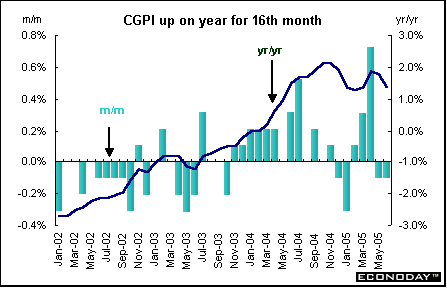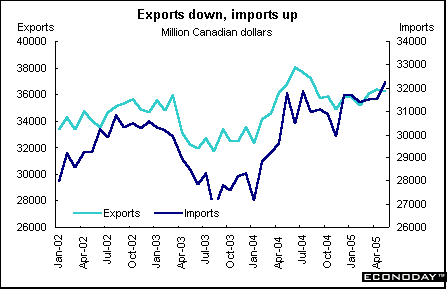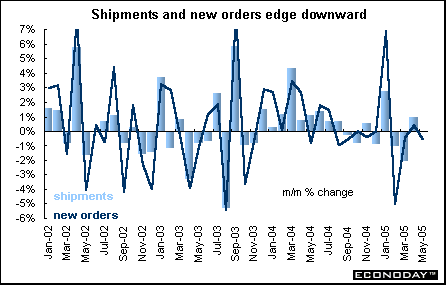Monday, July 18, 2005

Global Markets
Global equities bounded forward last week but faded on Friday thanks to declining heavyweight oil stocks as crude prices headed south. Eleven of 13 indexes followed here were up on the week and the FTSE was virtually unchanged while the S&P/TSX composite slipped 0.3 percent. Only the Dow and Nasdaq are still below their end of 2004 levels. Data in Europe and Japan were sparse but it was a heavy week in the U.K. and the U.S. Data in the U.K. were spotty while U.S. data were strong. The Banks of Canada and Japan met - both left policy unchanged.
Global Stock Market Recap

Europe and Britain
Stocks in Europe were up last week, but it wasn't due to favorable economic data. Rather it reflected in part, the shift in investor priorities to earnings results. In Germany, the DAX continued to climb and established new three-year highs on the way. Analysts said that in the absence of any concrete signs of imminent recovery, investors are looking forward to the possible change in government after the special election in September (assuming the request by Chancellor Gerhard Schröder is approved by German President Horst Koehler). German equities have been flying since Schröder announced his intentions for new elections on May 22nd. The DAX reached a new high for the year this week, having risen almost 7 percent since then and much faster than its European peers. Markets are viewing the election as a positive for structural reform - whether under a reelected Schröder government or, much more likely, a government led by Angela Merkel, leader of the opposition Christian Democratic Union.

Meanwhile, mounting rate cut hopes helped the FTSE 100 to rise to a fresh three-year high during the week. Cyclical stocks such as retailers led the way amid signs that investors were switching out of defensive utilities. Banking stocks were also strong after Goldman Sachs touted the sector, citing the prospect of rate cuts as well as solid interim results and robust loan growth. However, on Friday, stocks ebbed downward, losing the week's gain to finish virtually unchanged. Lower oil prices depressed energy company stocks such as BP and Shell while house builders suffered from the weakening housing market.
Asia/Pacific
Asian/Pacific stocks followed here were solid gainers last week even though enthusiasm seemed to wane on Friday. The Hang Seng continued its recovery after losing some steam earlier this month, weighed down by uncertainties such as rising interest rates and high global oil prices. But investors apparently have overcome their concerns. Property issues - which have lagged behind other Hang Seng stocks so far - are now contributing to the index's rise thanks to a strong economy despite higher interest rates and soaring energy costs. The index has finally recouped from a moribund second quarter and is 1.9 percent above its 2004 year end.
Japanese shares rose to a 14-week high on Thursday spurred on by the chip-making and technology sectors after better-than-expected earnings reports from U.S. peers and good news from the Bank of Japan. After an unexpectedly good quarterly profit report from computer chip maker Advanced Micro Devices, investors were quick to pick up Japanese competitors. The news followed a BoJ report that said the Japanese economy continued to recover. Overseas investors last week bought the most Japanese shares in 17 weeks according to the Ministry of Finance figures.

The Bank of Japan met last week and left monetary policy unchanged. Governor Toshihiko Fukui reiterated that the Bank has no plans to change the target for reserves available to banks. The bank kept its target for funds made available to lenders unchanged at between ¥30 trillion ($275 billion) and ¥35 trillion. At the May 20th meeting the monetary policy board decided to allow reserves to temporarily drop below its goal in response to weak cash demand. The Bank said it will continue its four-year-old policy of keeping interest rates near zero and of pumping cash into the economy until its self-imposed conditions are met - that is the Bank will not change its current policy framework until the CPI's year-on-year changes are stable above zero. Two of nine monetary policy board members said today that the central bank should lower the reserve target.
The Bank of Japan was more optimistic in its assessment of the economy, dropping a past reference to a recovery trend to say simply that the economy is recovering. Governor Fukui said the economy was emerging from a soft patch. The remarks underscored the central bank's brighter view of the economy in its July monthly report, in which it said the "economy continues to recover, albeit with adjustments in information-technology related sectors."
In its annual economic white paper, the Cabinet Office urged the Bank of Japan to adopt an inflation target. Japan's economy, in the Cabinet's view, is still going through deflation, which discourages companies from taking risks and therefore is slowing growth. The paper said that the Bank should implement effective monetary policy while monitoring movements of financial markets and their expectations.
Currencies
Currency trading was choppy last week with the dollar sinking prior to the release of the U.S. merchandise trade report, only to climb again when the deficit was not as bad as expected. This combined with an improvement in the U.S. fiscal deficit helped the dollar to climb mid-week. Benign inflation data in the U.S. gave the euro a lift.

The interest rate differential between the U.S. Federal Reserve's 3.25 percent interest rate and the European Central Bank's 2 percent interest rate continues to play a role in the respective currency's relationship. The dollar is up this year against the euro as the Federal Reserve has lifted its target interest rate nine consecutive times while the ECB has kept its benchmark rate for more than two years. Two other factors have been influencing the euro as well - political issues such as the French and Dutch no votes on the EU constitution and the fractious battle over the EU budget. Weak political leadership in France and Germany is not helping either.
The yen was little changed against the dollar this week. Some analysts expected that foreigners would increase their Japanese stock holdings in anticipation of faster economic growth. This was offset by others who continued to be concerned over imported oil dependency and the country's deteriorating trade surplus.

Interest rates on hold for Bank of Canada for now
The Bank of Canada as expected kept its policy interest rate at 2.5 percent but cautioned that a rate increase could occur soon as excess capacity vanishes and manufacturers adapt to the higher Canadian dollar. Canada's economy is the most export dependent of the Group of Seven industrialized nations. In its April comments on policy, the Bank cited the Canadian dollar's appreciation in reducing its economic growth forecast for 2005. But at the same time, job creation and mortgage rates matching the lowest level in 52 years have fueled consumer spending. Most analysts think the Bank will increase rates when they next meet in September. The Bank of Canada uses an inflation target range of between one and three percent and sets borrowing costs to keep price increases towards the middle of the range.

The Bank released its quarterly Monetary Policy Report on Thursday and confirmed analysts' assumptions that there would be an increase in interest rates in September. Essentially the report enlarged upon Tuesday's announcement. The Bank thinks the economy expanded at an annual rate of 2.3 percent and that the economy operated with a thin margin of slack in the second quarter, but that it will trend at capacity limits by the second half of 2006. Core CPI inflation is expected to rise from its current 1.6 percent level to the 2 percent target by the end of 2006. The Bank said some reduction of monetary stimulus would be required in the near term.
Indicator scoreboard
EMU - First quarter gross domestic product remained at an unrevised 0.5 percent when compared with the previous quarter. On the year, it was revised upward to 1.4 percent from 1.3 percent. Domestic demand was revised upward to 0.1 percent from unchanged as initially reported. Within domestic demand, gross fixed capital formation was revised to a decline of 0.4 percent from the drop of 0.7 percent previously reported.

France - May seasonally adjusted industrial output was up 0.3 percent but down 0.2 percent when compared with the same month a year ago. Manufacturing output was up 0.5 percent but down 0.1 percent on the year. Capital goods output was up 1.7 percent but autos were down 1.4 percent.

May seasonally adjusted merchandise trade deficit narrowed to €1.25 billion from €2.9 billion in April. Exports soared 7.4 percent while imports were down 1.4 percent. Exports were up thanks to capital goods and a major military contract. Oil imports were down as well as those of autos.

Italy - May seasonally and workday adjusted industrial production was down 1 percent and dropped 2.1 percent when compared with last year. Consumer and intermediate goods output sank 0.8 percent and 2.8 percent respectively. However, energy goods output was up 0.6 percent.

Britain - June output producer prices were down 0.2 percent and up 2.4 percent when compared with June 2004. The decline reflects drops in manufactured and alcoholic products. Core output prices which exclude gasoline, tobacco, food and beverages were unchanged on the month and up 2.2 percent on the year. Producer input prices jumped by 2.1 percent and are up 12.1 percent on the year. Crude oil prices sky rocketed 13.1 percent in June and 51.3 percent on the year.

June consumer price index was unchanged on the month and up 2 percent when compared with last year. Higher prices for food, in particular grapes and meat, put upward pressure on the index on the year. The retail price index less mortgage interest payments was up 0.1 percent and 2.2 percent on the year.

May world merchandise trade deficit narrowed to Stg4.962 billion from Stg5.132 billion in April. The trade deficit excluding oil and erratic items widened slightly to Stg5.515 billion from Stg5.22 billion. The deficit with the EU was virtually unchanged while the gap with non-EU countries was down.

June claimant count unemployment was up for the fifth month by 8,800 to 864,000. The string of rising claims was the longest stretch of increases in more than 12 years. As a result, the jobless rate climbed to 2.8 percent from 2.7 percent in the previous month. According to International Labour Organization measures, the U.K.'s unemployment rate in the three months through May rose to 4.8 percent from 4.7 percent in the quarter through April. The number of factory jobs is the lowest since records began in 1978. In the quarter through May, 81,000 factory workers were laid off, up from 79,000 in the quarter through April.

Average earnings the three months through May were up 4.1 percent when compared with the same three months a year earlier. Excluding bonuses for the same three months, average earnings were up 4 percent. May private sector average earnings excluding bonuses were up 3.8 percent when compared with May 2004. Earnings in the public sector were up 4.8 percent.

Asia
Japan - June corporate goods price index edged downward by 0.1 percent but was up 1.4 percent when compared with last year. This was the 16th straight month that the CGPI was up on the year, threatening to squeeze profits at companies struggling to pass costs on to customers. Prices of Dubai crude oil, a benchmark for Japan, have risen 60 percent this year.

Americas
Canada - May merchandise trade surplus was C$3.99 billion, down from April's surplus of C$4.9 billion. Exports fell 0.5 percent while imports, led by energy products and heavy machinery, soared by 2.3 percent. Canada's goods trade surplus with the U.S. in May dropped to C$7.83 billion from C$8.16 billion in April. Exports to the U.S. were unchanged while imports from the U.S. were up 1.6 percent from April. The trade deficit with countries other than the U.S. was C$3.84 billion, up from C$3.1 billion in April. Exports sank 2.6 percent while imports soared by 3.9 percent.

May manufacturers shipments edged down 0.1 percent from April and were up 1.7 percent when compared with last year. Excluding the transportation sector, shipments were up 0.6 percent. Ten of 21 industries accounting for 45 percent of all shipments reported declines. Durable goods shipments dropped 0.9 percent while nondurables jumped by 1.1 percent. Unfilled orders were up 0.6 percent and 7.2 percent on the year. Statcan said that recent gains in unfilled orders have not translated into a boom for shipments, perhaps because of record high capacity rates. Manufacturers operated at a record 87.0 percent of capacity in the first quarter. New orders were down 0.5 percent and were up 2.3 percent on the year.

Bottom line
London's rapid return to normality after the July 7th bombings is a tribute to the capital's strength in the face of terrorism. Sadly, it also is a reminder that the world has come to expect such acts - to a certain degree -and can withstand them. While such shocks tend to depress consumer focused businesses such as retail and tourism in the short run, experience after the Madrid bombings in May 2004 shows that longer term issues quickly reassert themselves as economic drivers.
No doubt high on everyone's agenda will be Wednesday's release of the Bank of England's monetary policy meeting minutes. Central bank watchers will want to know how the Bank reached its decision on July 7th in the midst of the terrorist attacks. With a light indicator week ahead, equity markets will focus in on the increasing flow of second quarter earnings results.
Looking Ahead: July 18 through July 22, 2005




